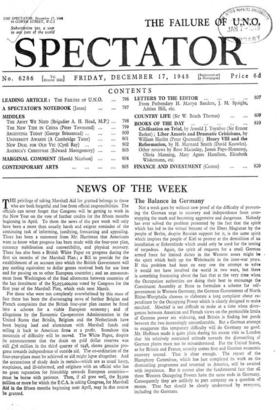The Balance in Germany
Not a week goes by without new proof of the difficulty of prevent- ing the German urge to recovery and independence from over- stepping the mark and becoming aggressive and dangerous. Nobody has ever solved the problem presented by the fact that the spirit which has led to the virtual boycott of the Ebert Magistrat by the people of Berlin, despite Russian support for it, is the same spirit which inspires the people of Kiel to protest at the demolition of an installation at Eckemforde which could only be used for the testing of torpedoes. Again, the spirit of requests for a small German armed force for limited duties in the Western zones might be the spirit which built up the Wehrmacht in the inter-war years. If this problem had been an easy one the attempt to solve it would not have involved the world in two wars, but there is something frustrating about the fact that at the very time when the Occupation authorities are doing their best to encourage the Constituent Assembly at Bonn to formulate a scheme for self- government in Western Germany, the German Government of North Rhine-Westphalia chooses to elaborate a long complaint about ex- penditure by the Occupying Power which is clearly designed to make mischief. Mischief is not difficult to make at a time when diver- gences between American and French views on the permissible limits of German power are widening, and Britain is finding her perch between the two increasingly uncomfortable. But a German attempt to exaggerate this temporary difficulty will do Germany no good. Mr. Hoffman made it quite plain during his recent visit to London that his relatively restrained attitude towards the dismantling of German plants must not be misunderstood. For the United States, as for Britain and France, security comes first and German economic recovery second. That is clear enough. The report of the Humphrey Committee, which has just completed its work on the dismantling programme and returned to America, will be awaited with impatience. But it cannot alter the fundamental fact that all three Western Occupying Powers have the same ends in Germany. Consequently they are unlikely to part company on a question of means. That fact should be clearly understood by everyone, including the Germans.


































